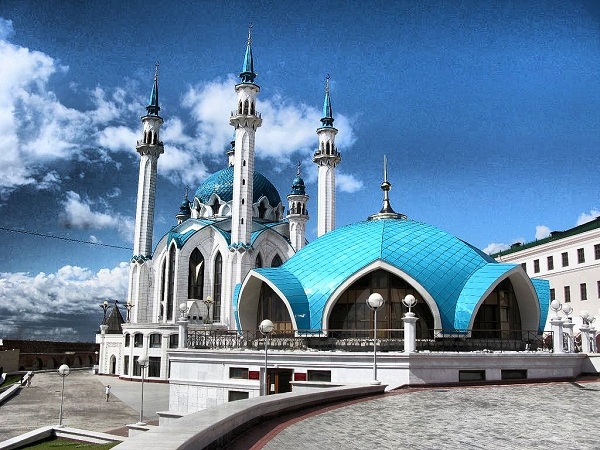There are at least 10 million Muslims in Russia, but only four public organizations where they can invest and borrow in compliance with the Quran.
Islamic finance is a fast-growing field worldwide, and proponents say it offers both ethical and practical benefits to the faithful and non-Muslims alike. Russia, however, lags behind in the industry, analysts and Russian Islamic financiers interviewed by The Moscow Times agreed.
Russian Muslims are slow to change their financial habits, while nonbelievers are plagued by a deep-rooted distrust of Islam — as are, to some extent, the financial authorities, who are in no hurry to adapt economic legislation to facilitate Islamic banking, analysts said.
“The religious renaissance that spans all creeds in Russia does not mean people rush out to seek services that comply with their religion,” said Andrei Juravliov, a leading expert on Islamic finance who teaches at Moscow State University.
Still, an Islamic finance industry has been budding over the past decade in Russia, and analysts and players show cautious optimism about its prospects.
“The niche is small, but the demand is better than, say, seven years ago,” said Rashid Nizameyev, the head of finance house Amal, which is one of those four venues to provide Islamic banking services.
“There are more believers now … though only a fraction try to actually live by their religion’s customs,” said Nizameyev, whose organization is based in Russia’s predominantly Muslim republic of Tatarstan.
No Money From Money
The core tenet of Islamic banking is a ban on riba, or interest, and loaning money for profit. The ban comes straight from the Prophet Muhammad, and is spelled out in the Quran.
On the face of it, such a ban should eliminate any possibility of sharia-compliant banking — but this is not actually the case.
The ban on “riba” prohibits making money from money. So instead, Islamic banks earn profits by co-investing in their clients’ goods and businesses (see table for examples.)
| Practice | Conventional Banking | Islamic Banking | Difference | |
| Consumer Credit / Murabahah | Bank loans money to the client to buy goods and services | Bank buys goods / services for the client, resells it to them | The bank offers: money vs. goods / services | |
| Joint Venturing / Musharakah | Bank loans money to the company, earns money through interest | Bank (co-)invests in a company, earns a portion of any profits | Bank gets money: regardless of company’s performance vs. only if the company turns a profit |
Islamic banks are also banned from financial speculation of any kind — where, again, money is made from money — as well as from investing in haram, or sinful, products, such as alcohol, pork and gambling.
The meticulously worded practices have seen a fair share of criticism from those who say they are just a piously worded cover-up for conventional banking.
This may be true in some cases, conceded Nizameyev of Amal.
But in general, true Islamic banking is more client-oriented: banks are supposed to go easy on borrowers in case of emergencies that render clients unable to pay, even up to forgiving their debts, said Juravliov of Moscow State University.
Moral vs. Financial Merit
The ethical nature of Islamic banking operations is one unquestionable — if nonmonetary — advantage of this practice, said Rinat Gabbasov, director of the Russian Center of Islamic Economics and Finance.
It can also at times prove an obstacle. Amal once had to refuse a prospective client who worked in a private security firm that guarded a distillery, said Nizameyev.
“Security services are good in and of themselves — but sadly, alcohol production is not,” he said.
The financial merit of the Islamic system is a more complicated issue. Gabbasov said Islamic banking offers better interest rates, and Nizameyev claimed that Amal’s investment portfolio had brought in returns of almost 21 percent in 2013, compared to the market average of 15 percent.
However, Juravliov of Moscow State University said that in general, Islamic banking operations are less profitable than conventional banking, but banks can make up for that by devoting a bigger share of the profits to dividends.
On the other hand, Islamic banking is more client-friendly, he said.
Thanks to its ban on financial speculations, interest in Islamic banking has even peaked worldwide since the last recession — though not necessarily in Russia.
Recent Invention
Nizameyev of Amal embraced finance first and Islam second.
Though always a believer, he was often negligent about practicing his faith until a routine class trip to a mosque as part of a religious studies class at the Kazan State Finance and Economics Institute in Tatarstan changed his ways, he said.
“I just felt something there, on a physical level,” the 33-year-old said.
He spent several years in conventional financial organizations before founding Amal, which offers halal financial services, in 2011.
He said that he trained himself in Islamic finance through self-study, though several colleges in Russia now offer courses on the subject.
Islamic finance is generally a recent invention, first developed in the 1960s. It has since grown to an industry with $1.3 trillion in assets as of 2012, according to last year’s Islamic Finance Development Report based on data by Thomson Reuters.
Among the powerhouses of Islamic banking are Malaysia, Saudi Arabia and Iran, although banks in many Western countries, including Britain and the United States, also offer halal-friendly banking services.
The first bank to offer Islamic financial services in Russia, Badr-Forte, folded in 2006. The industry has been gradually sprouting ever since and lately seems to be making headway.
Several non-Islamic Russian banks have attracted halal investment in recent years, including Ak-Bars Bank in Tatarstan, which brought in a total of $160 million in two investment deals in 2012 and 2013.
But despite these signs of growth, the country’s pool of officially registered Islamic financial institutions remains limited to two organizations in Tatarstan and two in the republic of Dagestan in the North Caucasus, said Gabbasov of the Russian Center of Islamic Economics and Finance.
Analysts agreed that the Islamic finance market is at an “embryonic stage” in Russia. Juravliov estimated the total volume of assets managed by Russian halal financial institutions at $10 million, a blip on the radar for the country’s banking system, whose total assets stood at 57.4 trillion rubles ($1.7 trillion) in 2013.
Nizameyev declined to disclose the size of Amal’s assets.
Practice What You Preach
The prospects for growth may seem glorious, given the size of Russia’s Muslim population. Muslims were estimated to make up 7 percent of the populace, or about 10 million people, by independent pollster Levada Center in 2013. In 1991, that figure was just 1.5 million.
However, many new believers are slow to change their practical habits, Juravliov said.
“Religion is one thing for them, and everyday life is another,” he said.
Russian regulations are also poorly suited to Islamic banking: Russian banks are supposed to refrain from trade operations, in which they would technically engage when providing many Islamic banking services.
“We do not expect the regulations to change any time soon,” Nizameyev said with a tinge of fatalism. His company circumvents the problem by registering as a “finance house,” not a bank.
Another problem is widespread distrust of Islam, a result of the 15 years of violent turmoil in the largely Muslim North Caucasus, analysts said. Many officials share this antipathy, which is why they have little desire to modify Russian legislation for the industry.
The situation is better in the Muslim heartlands: for example, authorities in Tatarstan are interested in supporting Islamic finance and have hosted numerous conferences on the matter, said Linar Yakupov, head of the republic’s Investment Development Agency.
However, Nizameyev said that this support has yet to translate into any kind of financial backing or tax breaks.
The industry still has plenty of room to grow — Thomson Reuters forecasts that Islamic banking assets in Russia will reach up to $10 billion by 2018, Gabbasov said.
The potential client base includes both Muslims and nonbelievers, analysts said — though some limitations are unavoidable. Amal regularly turns down deals worth tens of millions of rubles on ethical grounds, said Nizameyev.
And some client bases are yet to be evaluated for sharia compliance: for instance, Nizameyev conceded that Amal has no policy on gay clients.
“I am honestly not sure whether we would have a gay person for a client. It has never happened before and we would have to consult our sharia analysts,” he said.







0 Comments